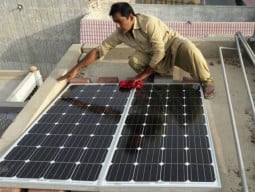
Only founded in 2010, the ALP is tasked with community-level policing to suppress violence in some of Afghanistan’s most dangerous and remote areas, and despite its many opponents it has had some success.
In Goshta district, two hours drive from the eastern city of Jalalabad and 40 kilometres (25 miles) from the Pakistan border, one unit of 200 ALP men has been in position for two months and has already been making its presence felt.
Its members, selected by local elders, were sent for just three weeks’ training by US special forces and then further instruction under the Afghan national police.
“This is the entry route from Pakistan, but now the Taliban are welcome to come,” Shinak, 40, a new member of the ALP, joked as he brandished his machinegun.
“I want to do the best for my community. I was chosen to serve by my village leaders because I don’t have a criminal record and because I don’t use drugs.”
The ALP is often accused of thuggery and operating outside the law, and its reputation was further damaged by an attack on December 24 when an officer shot dead five of his colleagues.
But US supervisors of the ALP say its 18,000 men nationwide provide practical, low-cost protection from the insurgents, and they dismiss suggestions that its ranks are half-hearted, criminals or Taliban sympathisers.
“The enemy has declared the ALP their number-one threat,” Colonel Don Bolduc, who is in charge of the training project for the US military, told AFP. “The army and police see them as an asset.
“People come with this preconceived idea that local defence forces are unruly, not accountable to the government and will be violent.
“But they are relevant, resilient, accountable and cost-effective. Those things weigh heavily on how the Afghan government will see the local police 10-15 years from now.”
Bolduc said a recent case in which four officers were jailed for rape in Kunduz province actually proved that legal standards were being enforced.
A truer sign of the ALP’s commitment to Afghanistan’s future, he suggested, was that 353 men had died in action since 2010.
The 30 latest recruits in Goshta appeared young, clumsy and lacking in experience, “but when they fight, they fight good”, said Shakrullah Amanzai Dagarwal, the district chief of Goshta.
“The ALP operate in their local communities, so they have the support of the people,” he told AFP. “They are ready 24 hours a day, and these men are given information by villagers.”
The ALP, a flagship policy of former commander General David Petraeus, was designed to be a homegrown force of locals ready to take on Taliban hardliners in places where the national police and army were scarce.
“The main goal of ALP is to involve people securing their own people and also to build trust towards the government,” Ali Shah Ahmadzai, the Afghan general in charge of the ALP, told AFP in Kabul.
“We can see a 60 percent decrease in security problems after the establishment of the ALP,” he said, adding that he was being assailed by districts who want local ALP units to be set up.
But others are less convinced.
“A number of individuals who have been recruited in the ALP have had membership records in illegal armed groups and the Taliban,” the Afghanistan Independent Human Rights Commission (AIHRC) said in a recent report.
“Most of them have been members of hostile groups in the past. Some of them are notorious for having committed criminal acts... There are individuals within the ALP who have bad war records and who are even serial killers.”
The report concluded that the ALP could turn “into the armed opposition resisting government authority” -- adding to the volatile mix of factions that many fear could trigger civil war after international troops depart in 2014.
“Reducing insecurity in the short-term has positive aspects but it is laying the ground for problems in the future,” said Fabrizio Foschini from the Afghanistan Analysts Network.
“The ALP means an increased number of armed men who respond to local agendas and are not in close cooperation with Afghan institutions.
“These ALP could start fighting each other for prominence. In my view, it is not worth it.”



















1713904359-0/burn-(1)1713904359-0-270x192.webp)

























COMMENTS
Comments are moderated and generally will be posted if they are on-topic and not abusive.
For more information, please see our Comments FAQ